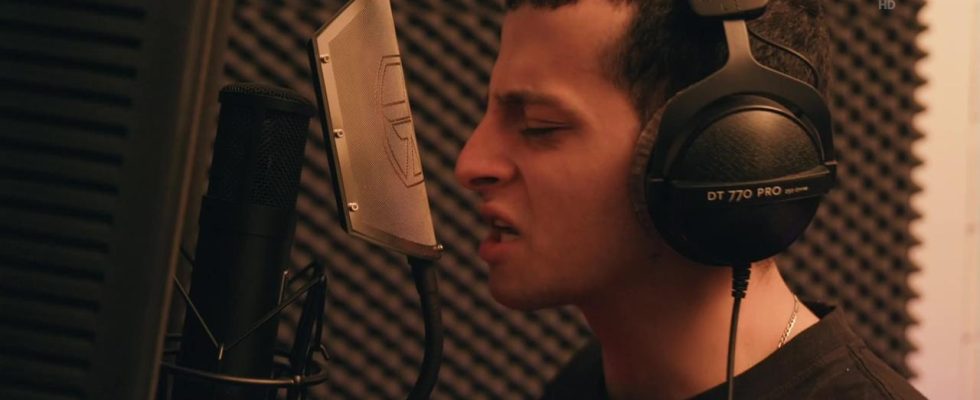in the middle
The “Basement26” in Frankfurt am Main is an important contact point for many young people. One way for social workers to connect with them is through rap. They process difficult experiences through music.
“It’s nice that you’re here,” says social worker Erin Sullivan with a broad grin before warmly hugging 19-year-old Obay Alhameadi. “How are you?” he asks. A friendly atmosphere immediately develops and Obay begins to talk. A symbolic scene – because that’s what it often looks like today when Erin Sullivan greets one of the 15 boys who came here that day.
“For some people, this is like a second home,” says the 37-year-old, who runs “Basement26” in Frankfurt am Main. Some of the young people – the boys are among themselves here – prefer to chill on the couch and play FIFA. Others play basketball. The youngest this afternoon is 12-year-old Martin (Name changed by the editor), who comes from being taken into care nearby. He is in Frankfurt without his parents and only wants to stay for three months.
“This is a docking point here,” says Erin Sullivan about the children’s and youth meeting of the non-profit Bethanien Diakonissen Foundation, which is located in the basement of a nursing home. “You meet friends, you can go boxing or make music, for example.” The children and young people, many of whom have a migrant background, could focus on this instead of “playing nonsense outside somewhere,” says Sullivan.
Rap music as key
Music plays a very special role in this. “Every second person here listens to rap privately,” says the head of “Basement26”. Rap music embodies something “from the streets” and is the opportunity to tell something that you have experienced yourself, explains Sullivan. He started rapping as a teenager himself, but had no place to record his music.
That’s exactly what he’s created now: the youth club leader has transformed an old storage room into a small recording studio. Only two people fit in here – himself, who mixes the music, and an amateur rapper. The young people don’t have to pay for it.
Eric Sullivan runs Basement26.
Obay Alhameadi stands in front of the microphone here as often as possible and has already recorded a dozen rap songs. His role model: Eminem.
At the beginning he always had sweaty palms and was very excited, says the 19-year-old Syrian with a grin. You can tell how excited he is to produce another song today. A friend made the beat for it and he has the lyrics on his cell phone.
“I rap about my story,” says Alhameadi. He fled Syria with his family eight years ago. “I saw death before my eyes,” he says, becoming serious.
Young people process difficult experiences through their music
During his escape, he was imprisoned a total of seven times in several countries, was beaten and separated from his parents. “I was illegal, therefore an illegal person,” says Alhameadi, describing the reason for his imprisonment.
“When I came to Germany, I also had a lot of difficulties. But they were all easier difficulties than in Syria,” said the 19-year-old. He recently completed his technical high school diploma in Frankfurt. He wants to start a voluntary social year soon. “That’s why I always remain grateful.”
Obay Alhameadi rhythmically nods his head to the beat, moves his hands to his rap text, which he sometimes spontaneously completes in freestyle. In English he describes the problems of his youth – and also how a good friend was shot in front of his eyes.
Rap as starting point for conversations
Social worker Erin Sullivan is half-American himself and therefore understands the English lyrics well, which he mixes to the music via headphones. “It’s really crazy at times, especially when you really know the people. It really takes you away,” he admits. “When I hear things, I speak up,” he reports about this modern form of social work that helps young people like Obay Alhameadi to come to terms with difficult experiences.
The music in “Basement26” is a real door opener for conversations that might otherwise not take place. There is not always an intensive exchange about profound problems, explains the head of the children and youth meeting. He doesn’t want to constantly annoy the boys, but instead wants to give them something to compensate for.
If they wanted to be distracted from their reality, “they can do it with us,” said Sullivan. With the recording studio you can simply get people off the street so that they aren’t “chilling around on park benches.” Because many would get bored, sit around outside and then resort to alcohol or drugs.
Young people are grateful
The music “takes the focus away and ensures that they don’t fall into the same pattern over and over again. This gives them the opportunity to live their lives differently,” explains the social worker.
“It means everything to me,” confirms Obay Alhameadi, looking gratefully at Erin Sullivan. “It helps you process things.” The 19-year-old Syrian emphasizes that it’s like therapy for him. “I don’t know where I would be without the studio parts with Erin.”

